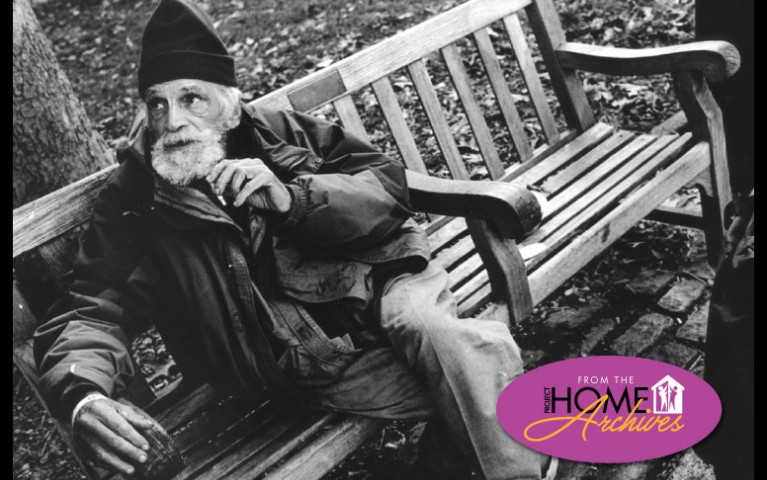From the Archives: "A Community of Recovery"

From our earliest years, we have recognized the tragic link between homelessness and addiction. Over the years, we have constantly sought to grow in both our understanding of and response to addiction (see “Saving Yourself Starts with Welcoming MAT” outlining our new programs and services specifically designed to address the current opioid crisis). With the invaluable wisdom and experience of many of our residents, we continue to work to promote authentic and holistic recovery – both to heal those seeking to break the cycle of homelessness and to a society trapped in many forms of addiction. This reflection was written in our May 1998 newsletter.
It is all too familiar a scene: outside a Center City business establishment, a disheveled man asks passersby for spare change. For some, his presence evokes compassion; for many, discomfort and confusion. Some people respond to him in anger and spite.
The homeless panhandler – he is an icon of modern America, an eyesore in the gleaming metropolis, an indictment on a society increasingly frayed by vast disparities. He represents a complex nexus of factors: a personal story of trauma, poverty, and disease, but also communal abandonment and failed social support systems.
In our encounter with the panhandler, we are all drawn into a vast social wound of suffering, helplessness, failure, and dehumanization. Easy answers elude us. Something of our common humanity is at stake.
In most cases, beneath the surface of panhandling is addiction. Despite lingering perceptions of addiction as a moral flaw, it is in fact a vicious disease, one with complex personal and social repercussions. The answer to addiction is recovery – the hard, painful, but hopeful work of healing of body, mind, and soul. Recovery – including treatment programs, 12-step groups, and supportive community – is a life-long journey, a radical reorientation of the self that begins by breaking from alcohol or drugs and continues into ongoing healing of deep psychic wounds that originally fostered the addictive craving.
If we want to assist those who suffer from homelessness and addiction, we must assure that the resources for recovery are available and accessible. We must advocate for programs and services that can make a real difference. We must also risk entering relationships with addicted persons – but in ways that do not enable them to continue in self-destructive behaviors. It is crucial that we foster honesty, even lovingly urging an addict to break out of denial and confront the addiction. We urge our friends, if you encounter a person experiencing homelessness and addiction, to contact our Outreach Coordination Center (OCC) at 215-232-1984. The OCC can dispatch a drug and alcohol team to work with the person on pursuing recovery.
But we must do more than refrain from giving money to an addicted panhandler. We must also become a community that commits to a spirit of recovery, offering a support to those on that journey with our hearts as well as our resources. Rather than sending messages of blame that further stigmatize and dehumanize addicted persons, we must send messages of affirmation and healing.
Being a community of recovery is only possible when we grasp that ultimately, we all need recovery. Addiction is not limited to drugs and alcohol. In this culture of materialism and consumerism, we are constantly being told that our worth as persons depends on having enough money, power, status, success, or beauty. We are bombarded with literally thousands of messages each day designed to make us feel inadequate, and to evoke in us cravings and desires. All of us are constantly being seduced by false values that diminish our humanity and weaken our communities.
The panhandler is not some ominous “other,” who intrudes on our ordinary, daily lives. He symbolizes a brokenness we all ultimately share, a sickness in our culture, and a failure of our society to foster wholeness and sanity. He invites us all to rediscover healthy selves and healthy community.
We all need recovery – in many cases for substance abuse, mental illness, homelessness, and poverty. We also need – whatever our social situation – recovery of hope, dignity, and wholeness. We need to recover from our culture’s rampant individualism and toward a renewed ethic of self-love that finds its fulfillment in love to others. All of us, in some part of our spirit, have our hand out, begging for a genuine experience of community and mutual care.
Let us take each other’s hand. Let us embark together on a journey of recovery. What we have to discover is our common humanity.